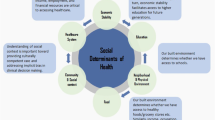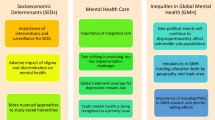Abstract
Purpose: To explore poor Edmontonians’ access to medical treatment services.
Methods: Data were collected during interviews with 130 poor Edmontonians.
Results: 38% of study participants had failed to obtain physician services when they were sick or bothered by a health problem, and 40% who had been prescribed a medication had not filled the prescription. Participants experienced three main barriers to access: lack of money, lack of comprehensive health care coverage, and lack of affordable transportation. Findings suggest that a variety of health care and social assistance policies limit access to treatment services for people living in poor families.
Conclusion: Despite the principles of the Canada Health Act, access to medical treatment is not based solely on need, but is tied, in part, to income. There is a need for health care, social, and economic policies that aim to reduce the barriers that limit access to physician services and prescription medications by people living in poverty.
Résumé
Objet: Explorer l’accès aux services thérapeutiques essentiels dont bénéficient les résidents(es) défavorisé(e)s de la ville d’Edmonton.
Méthodes: Les données ont été colligées lors d’entrevues effectuées auprès de 130 résidents(es) d’Edmonton vivant sous le seuil de la pauvreté.
Résultats: 38% des participants(es) à l’étude ne se sont pas prévalu(e)s des services d’un médecin lorsque cela s’avéra nécessaire et 40% n’ont pas fait remplir leur ordonnance médicale. Trois principaux obstacles semblent contribuer à limiter l’accès des participants(es) aux soins de santé de base: l’insuffisance de moyens financiers, une assurance médicale partielle, et l’absence de moyens de transport abordables. Les résultats suggèrent qu’une variété de politiques sur les soins de santé et sur l’aide sociale restreignent l’accès aux services thérapeutiques essentiels qu’ont les individus vivant dans des familles défavorisées.
Conclusion: Malgré les principes qui soustendent la Loi canadienne sur la santé, l’accès aux soins de santé n’est pas uniquement fondé sur le besoin, il est également partiellement lié au revenu. Il devient donc impératif d’implanter des politiques de soins de santé ainsi que des politiques sociales et économiques visant à réduire les obstacles qui limitent l’accès aux services thérapeutiques de base et aux ordonnances médicales pour les personnes vivant dans la pauvreté.
Similar content being viewed by others
References
Di Marco MM, Storch JL. History of the Canadian health care system. In: Wilson D (Ed.), The Canadian Health Care System. Edmonton, 1995; 5–15.
National Forum on Health Care. Canada Health Action: Building on the Legacy. Ottawa: Minister of Public Works and Government Services, 1997.
Peters S. Exploring Canadian Value. Foundations For Well-Being. Ottawa: Canadian Policy Research Networks Inc., 1995.
Silver S. The struggle for national standards: Lessons from the federal role in health care. In: Pulkingham J and Ternowetsky G (Eds.), Remaking Canadian Social Policy. Social Security in the Late 1990s. Halifax: Fernwood Publishing, 1996; 67–80.
Ross DP, Shillington R. The Canadian Fact Book on Poverty — 1989. Ottawa: Canadian Council on Social Development, 1989.
Statistics Canada. Income Distribution by Size in Canada. Ottawa: Minister of Industry, Science & Technology, 1992.
Alberta Family and Social Services. One Step at a Time: Supports for Independence. Edmonton: Author, 1991; 1994 update.
Oderkirk J. Parents and children living with low incomes. Canadian Social Trends 1992;27:11–15.
Ross DP, Shillington ER, Lochead C. The Canadian Fact Book on Poverty. Ottawa: Canadian Council on Development, 1994.
Statistics Canada. Families: Number, Type, and Structure. Ottawa: Minister of Industry, Science & Technology, 1992.
Brand FN, Smith RT, Brand PA. Effect of economic barriers to medical care on patients’ non-compliance. Public Health Rep 1977;92:165–81.
Lexchin J. Income class and pharmaceutical expenditure in Canada: 1964–1990. Can J Public Health 1996;87(1):46–50.
The Family Service Association of Edmonton and the Income Security Action Committee. Working Hard, Living Lean: A Qualitative Study of Working Low-Income Families in Edmonton. Sherwood Park: Holmgren Publishing Group, 1991.
Alberta Blue Cross. Non-Group Coverage. Hospital and Health Coverage for Albertans. Edmonton: Author, 1995.
Duncan ML. Alberta Association of Social Workers Submission to the Community Services Committee, City of Edmonton, Regarding Cuts to Alberta Income Support. Edmonton: Alberta Association of Social Workers, 1994.
Community and Family Services, The City of Edmonton. Social Assistance Benefits Cutbacks. Edmonton: Author, 1994.
Edmonton Social Planning Council and Edmonton Gleaners’ Association. Two Paycheques Away: Social Policy and Hunger in Edmonton. Edmonton: Authors, 1996.
Northam S. Access to health promotion, protection, and disease prevention among impoverished individuals. Public Health Nurs 1996;13(5):353–64.
The Liberal Party of Canada. Securing Our Future Together. 1997.
Author information
Authors and Affiliations
Corresponding author
Additional information
Financial support for this study by a research grant (#6609-1963-55) from the National Health Research and Development Program (NHRDP) of Health Canada is gratefully acknowledged. The views presented are those of the authors and do not necessarily represent those of Health Canada.
Rights and permissions
About this article
Cite this article
Williamson, D.L., Fast, J.E. Poverty and Medical Treatment: When Public Policy Compromises Accessibility. Can J Public Health 89, 120–124 (1998). https://doi.org/10.1007/BF03404403
Received:
Accepted:
Published:
Issue Date:
DOI: https://doi.org/10.1007/BF03404403




